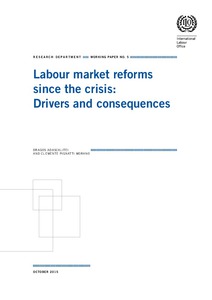Labour market reforms since the crisis: drivers and consequences
"The paper analyses the determinants and effects of reforms of employment protection legislation (EPL), using a novel inventory that covers 111 developed and developing countries between 2008 and 2014. The analysis finds that in developed economies, reforms were mostly directed towards relaxing...
| Main Authors: | , |
|---|---|
| Institution: | ETUI-European Trade Union Institute |
| Format: | TEXT |
| Language: | English |
| Published: |
Geneva
2015
ILO |
| Subjects: | |
| Online Access: | https://www.labourline.org/KENTIKA-19109448124919276209-Labour-market-reforms-since-th.htm |
| Summary: | "The paper analyses the determinants and effects of reforms of employment protection legislation (EPL), using a novel inventory that covers 111 developed and developing countries between 2008 and 2014. The analysis finds that in developed economies, reforms were mostly directed towards relaxing labour regulation and were driven by high unemployment rates and low levels of GDP growth. By contrast, in developing economies reforms tended to increase workers’ protection and were more likely to occur in countries experiencing high levels of GDP growth – while not being sensitive to unemployment rates. Furthermore, we test the effects of these reforms on labour market outcomes. We find that deregulation decreases employment rates in both developed and developing countries in the year after implementation. Deregulation also increases unemployment rates in developed economies in the short-term; but the effect is not statistically significant in developing countries." |
|---|---|
| Physical Description: | 1 v. Digital |

